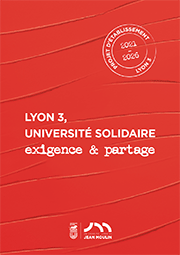AccueilRechercheLes productions scientifiquesThèsesThèses soutenuesThèses soutenues - 2006-2020Thèses soutenues - 2014
-
Partager cette page
- Recherche,
ZINTY Stéphane
La constitution du droit réel par l’effet de la tradition
Thèse en Droit mention droit privé soutenue le 28 mai 2014.
La consécration par le Code civil de 1804 de la règle du transfert de propriété solo consensu a conduit à envisager la constitution du droit de propriété distinctement de son opposabilité erga omnes. Une situation identique se constate en présence d’un droit réel démembré, où la constitution du droit est fréquemment indépendante de l’opposabilité aux tiers, qui dépend de l’accomplissement d’un procédé ostensible. Cependant, ce schéma contrevient à l’opposabilité substantielle du droit réel, qui assure à son titulaire l’exclusivité de sa relation juridique avec la chose. En effet, la constitution du droit réel repose sur un phénomène de transmission qui en représente le rouage essentiel : il s’agit de la transmission d’un bien en présence du transfert de propriété ou de celle d’un avantage économique sur le bien grevé d’un droit réel démembré. Par nature risquée pour les tiers, cette opération translative nécessite qu’une personne ne puisse opposer son droit aux tiers qu’après l’exécution d’un formalisme d’extériorisation. Elle révèle ainsi la particularité du régime juridique de l’opposabilité substantielle du droit réel, qui est caractérisée par cette réciprocité vis-à-vis des tiers. Cette approche s’articule mal avec l’idée d’une constitution conventionnelle du droit réel où son opposabilité est appréhendée de façon duale : à l’état « virtuel » lors de l’échange des consentements et à l’état « effectif » avec l’accomplissement d’un procédé ostensible. L’opposabilité « conventionnelle » est un concept creux car sans effet juridique, de sorte que l’opposabilité substantielle du droit réel entretient une relation exclusive avec le formalisme la mettant en oeuvre. Se trouve ainsi fondée la perspective d’une constitution du droit réel par l’effet de la tradition car celle-ci, au-delà de sa matérialité originelle, extériorise l’opération translative inhérente au droit réel et en préserve ainsi l’opposabilité substantielle. Il est dès lors question d’analyser précisément la manière dont la règle de la constitution sola traditione du droit réel pénètre le droit positif. Or, à cet égard, elle fait œuvre de rationalisation.
The consecration by the civil code of 1804 of the rule of ownership transfert solo consensu led to envisage the constitution of the property right clearly of its erga omnes opposability. An identical situation prevails frequently in the presence of a real dismembered right, where the constitution of the right is frequently independent from the opposability in third parties, which depends on the fulfillment of a patent process. However, this plan violates the substantial opposability of the real right, which assures his holder the exclusivity of its legal relation with the thing. The constitution of the real right based on a phenomenon of transmission which represents the essential cog: it is about the transmission of the thing in the presence of ownership transfer or of that of an economic advantage. It reveals the peculiarity of the legal regime of the opposability of the real right, which is characterized by this reciprocity towards thirds parties. This approach articulates badly with the idea of a conventional constitution of the right reality where its opposability is arrested in a two-tier way: in the “virtual” state during the exchange of the consents and in the ‘actual” state with the fulfillment of required formalism. The consensual opposability of the real right is a hollow concept because ineffective legal, so that the formalism of opposability maintains an exclusive relation with the substantial opposability.The perspective of a constitution by the tradition is so established, which is endowed with a constituent effect of right because, beyond her original materiality, she exteriorizes the translative operation inherent to the real right and so protects the substantial opposability from it. It is necessary from then on question to analyze exactly the way the rule of the constitution sola traditione of the real right penetrates the substantive law. Now, in this respect, it acts as rationalization.
Mots-Clés : Droit réel ; échange des consentements ; opération translative ; opposabilité ; opposabilité substantielle ; publicité légale ; transfert de propriété ; tiers ; tradition
Keywords : Exchange of consents ; opposability ; ownership transfert ; substantial opposability ; tradition ; third parties ; transmission
Directeur de thèse : William DROSS
Membres du jury :
Philippe CHAUVIRE, Professeur, Université de Nancy
Frédéric DANOS, Maître de conférences HDR, Université Paris 1
Philippe SIMLER, Professeur émérite, Université de Strasbourg
Françoise PEROCHON, Professeur, Université Montpellier I
William DROSS, Professeur, Université Jean Moulin Lyon 3
Président du jury : Philippe SIMLER
Mention : Très honorable avec les félicitations
Equipe d'accueil : Equipe de droit privé



